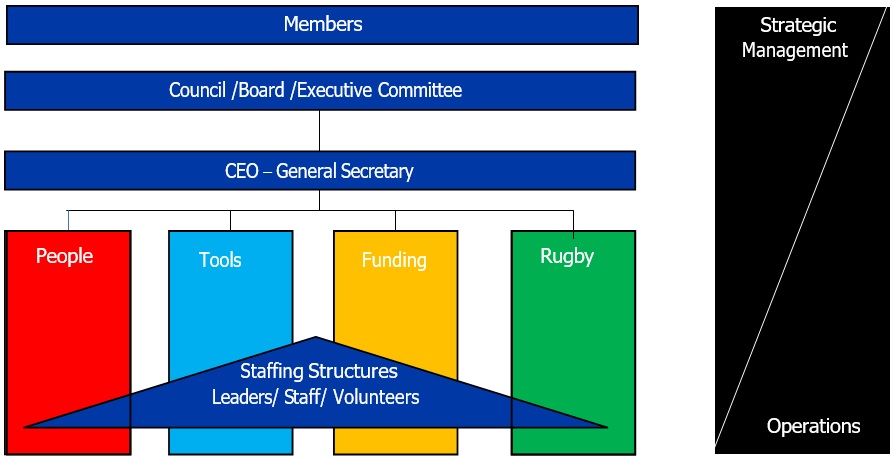Organisational Structure
The diagram below represents how a well-developed rugby organisation might be structured:

Organisations should be encouraged to have an organisational organogram or chart which outlines the composition of the organisation, the differing levels of hierarchy, the roles and responsibilities of the different groups and their interactions. This will help to clarify the function of the different groups.
Main roles and responsibilities within an organisation
Members
- Members can be individuals or organisations that make up the organisation and contribute to its objectives. They meet certain eligibility criteria and have obligations and rights (including voice and vote). They usually meet annually, during the general assembly or annual general meeting.
Board
- A Board exercises the representation, direction and management of the organisation. It is a group of people elected or appointed by the members of the organisation with the responsibility for the governance of the organisation. A Board is responsible to the members of the organisation (General Assembly). Its activities, powers, rights and responsibilities are defined in the constitution, statutes and regulations of the organisation. The President or Chairperson chairs the Council.
- The primary function of the Board is to preserve public trust. It should maintain the trust of its members, its community and the organisation as well as maintain its legality. It should do this by making prudent decisions, putting the benefit of the organisation above other interests and to act according to its constitution and statutes.
- The secondary function of the Board is to set and monitor the delivery of the strategic plan. It should do this by selecting an appropriate Executive Committee who then oversee the employees
- The Board should be formed by a Chair, a Secretary, a Treasurer and at least two members. The duration of their term of office depends on the statutes and constitution and they may or may not be able to be re-elected.
- The Chair is responsible for the achievement of the strategic goals of the organisation and the general management of its operational They should:
- legally and formally represent the organisation
- convene and chair main meeting such as the general assembly
- structure and submit periodic and annual reports to the Board or General Assembly
- Coordinate and promote the activities of the Board and the organisation
- The Board members may have their own duties (e.g. Secretary) but may also be have some duties delegated to them by the Board (e.g. siting on working committees).
- In amateur rugby organisations, the Treasurer safeguards the integrity of the organisation by accurate recording of the financial position of the organisation. They should prepare the budget and monitor the spend of the organisation. They are responsible for the collection of fees, donations and other income as well as making payments to suppliers. Usually, they hold the bank signature in agreement with the Chair. In professional rugby environments, there is usually a director or financial manager with responsibility for the day to day financial administration with an oversight from an audit and risk committee.
The importance of separability
In many organisations which rely on volunteers, Board members may cover more than one area of responsibility. Should this occur it is vital that they must keep their responsibilities differentiated. Good practice is for Board members to stay out of operations and focus instead on the areas of strategic direction, policy, supervision and evaluation. Should Board members take on operational roles, they may tend to raise operational issues which detract from their primary role as a Board member.
Board members may find themselves focusing on operations:
- if there are not enough staff or volunteers to delegate the job to
- if it is easier to understand operational roles rather than strategic roles
- as the emotional return of operations may be faster than the emotional return of strategy
- as operations are where the action is, and it may not be as much fun to work on strategy or governance.